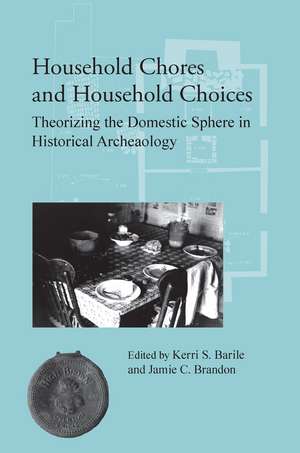Household Chores and Household Choices: Theorizing the Domestic Sphere in Historical Archaeology
Editat de Kerri S. Barile, Jamie C. Brandon Contribuţii de Mary Jo Galindo, Mindy L. Bonine, Efstathios I. Pappas, Maria Franklin, Mary C. Beaudry, Whitney L. Battle, Margaret C. Wood, Leslie C. Stewart-Abernathy, Nesta Anderson, James M. Davidson, Dr. Suzanne M Spencer-Wooden Limba Engleză Paperback – 25 iun 2004
Discusses the concepts of “home,” “house,” and “household” in past societies
Because archaeology seeks to understand past societies, the concepts of "home," "house," and "household" are important. Yet they can be the most elusive of ideas. Are they the space occupied by a nuclear family or by an extended one? Is it a built structure or the sum of its contents? Is it a shelter against the elements, a gendered space, or an ephemeral place tied to emotion? We somehow believe that the household is a basic unit of culture but have failed to develop a theory for understanding the diversity of households in the historic (and prehistoric) periods.
In an effort to clarify these questions, this volume examines a broad range of households—a Spanish colonial rancho along the Rio Grande, Andrew Jackson's Hermitage in Tennessee, plantations in South Carolina and the Bahamas, a Colorado coal camp, a frontier Arkansas farm, a Freedman's Town eventually swallowed by Dallas, and plantations across the South—to define and theorize domestic space. The essays devolve from many disciplines, but all approach households from an archaeological perspective, looking at landscape analysis, excavations, reanalyzed collections, or archival records. Together, the essays present a body of knowledge that takes the identification, analysis, and interpretation of households far beyond current conceptions.
Because archaeology seeks to understand past societies, the concepts of "home," "house," and "household" are important. Yet they can be the most elusive of ideas. Are they the space occupied by a nuclear family or by an extended one? Is it a built structure or the sum of its contents? Is it a shelter against the elements, a gendered space, or an ephemeral place tied to emotion? We somehow believe that the household is a basic unit of culture but have failed to develop a theory for understanding the diversity of households in the historic (and prehistoric) periods.
In an effort to clarify these questions, this volume examines a broad range of households—a Spanish colonial rancho along the Rio Grande, Andrew Jackson's Hermitage in Tennessee, plantations in South Carolina and the Bahamas, a Colorado coal camp, a frontier Arkansas farm, a Freedman's Town eventually swallowed by Dallas, and plantations across the South—to define and theorize domestic space. The essays devolve from many disciplines, but all approach households from an archaeological perspective, looking at landscape analysis, excavations, reanalyzed collections, or archival records. Together, the essays present a body of knowledge that takes the identification, analysis, and interpretation of households far beyond current conceptions.
Preț: 256.17 lei
Nou
Puncte Express: 384
Preț estimativ în valută:
49.02€ • 52.42$ • 40.87£
49.02€ • 52.42$ • 40.87£
Carte indisponibilă temporar
Doresc să fiu notificat când acest titlu va fi disponibil:
Se trimite...
Preluare comenzi: 021 569.72.76
Specificații
ISBN-13: 9780817350987
ISBN-10: 0817350985
Pagini: 292
Dimensiuni: 156 x 235 x 20 mm
Greutate: 0.57 kg
Ediția:First Edition, First Edition
Editura: University Of Alabama Press
Colecția University Alabama Press
ISBN-10: 0817350985
Pagini: 292
Dimensiuni: 156 x 235 x 20 mm
Greutate: 0.57 kg
Ediția:First Edition, First Edition
Editura: University Of Alabama Press
Colecția University Alabama Press
Notă biografică
Kerri S. Barile is a principal investigator with SWCA Environmental Consultants in Austin, Texas, and a Ph.D. candidate at UT-Austin.
Jamie C. Brandon is Visiting Instructor with the University of Arkansas and an archaeologist with the Arkansas Archeological Survey.
Jamie C. Brandon is Visiting Instructor with the University of Arkansas and an archaeologist with the Arkansas Archeological Survey.
Recenzii
“This collection of papers does a fine job of illustrating the shortfalls of projecting normative views of household structure, organization, composition, and spatiality into the past.”
—Laurie Wilkie, University of California-Berkeley
—Laurie Wilkie, University of California-Berkeley
Descriere
Discusses the concepts of “home,” “house,” and “household” in past societies
